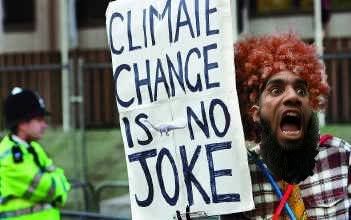
Taken almost as a dogma, the AGW has been forcefully imposed by means of a barrage of scare stories and indoctrination that begins in the elementary school textbooks and is volleyed relentlessly upon us by the media and many scientific institutions (including some pseudo-scientific ones), while gullible or opportunistic politicians devise all possible means of inserting climate-motivated items into their power-seeking schemes.
The threat allegedly posed by that supposed world emergency would justify the need of at least halving the human carbon emissions until mid-century, meaning a draconian reduction of the use of fossil fuels worldwide. Despite the drastic potential impact of such measures upon the living standards of all nations, the failure to do so and of establishing a "low-carbon economy," we are told, would usher the environmental apocalypse in. Well, fortunately for Mankind it won't.
However, that avalanche has gone too far. So, it's high time to turn the alarmist page and discard the buzzwords with which the subject has been marketed once and for all: (undeserved) hype, (unmotivated) scare, (unnecessary) restrictions and (unacceptable) sacrifices. In their stead new keywords are needed to put the climatic phenomena into their proper perspective again: proportion, knowledge and resilience.
Real global emergencies
As to the real global emergencies requiring urgent actions on new levels of international attention, cooperation, coordination and funding, there is no shortage of them. For those seriously interested in this business, here are some that do not exist only in supercomputer-run mathematical models and that would benefit very much from fractions of the colossal amounts of money – and human resources – that have been wasted with the non-existent AGW:

- The world's most serious environmental troubles, particularly in the developing countries, are those related to the lack of water and sanitation infrastructure, like water pollution and the water-borne diseases that kill a child every 15 seconds in the developing countries, according to the World Health Organization. A 2007 poll conducted by the British Medical Journal among physicians all over the world elected fresh water and sanitation infrastructure as the greatest medical advance of the last 150 years – a "privilege" still unavailable for over 40% of the world's population. In Brazil, less than half of the population have access to sewage systems and two thirds of the child internments in the public health system are due to water-borne diseases. (I've never seen Al Gore, Hollywood stars or the major environmental NGOs campaigning for sanitation.)
- Hunger and its consequences kill a child every six seconds, according to the FAO. Almost one billion people all over the world suffer from chronic hunger, a scenario that will surely worsen due to the current speculation-driven price rise affecting some basic staples. Besides the immoral waste of productive lives, the annual economic cost of such a tragedy in productivity, revenue, investment and consumption losses is estimated in the order of hundreds of billion dollars.
- The lack of access by much of the world's population to modern energy sources. Dung and firewood, the most primitive fuels known to Mankind, are still the basic resources for the daily needs of most of the Sub-Saharan Africans (besides being major sources of deforestation and respiratory diseases). Although with lower figures, the same happens in much of Asia, Latin America and the Caribbean. And, as over 80% of the world's primary energy needs are provided by coal, oil and natural gas, it's not difficult to ascertain the potential consequences of the intended restriction of their uses, as proposed by many scientists, environmentalists, politicians, carbon traders and all the people terrified by the AGW scare stories. Besides that, thermoelectric plants generate about two thirds of the world's electricity, the rest being almost totally provided by hydroelectric and nuclear plants (also increasingly targeted by the environmentalists).
In any case, make no mistake. Barring an unforeseen technological breakthrough, there won't be large scale replacements for the fossil fuels until late this century at least. Massive national and international investments in efficient and integrated multi-modal and urban transportation systems may and should help to reduce the use of automobiles and trucks, particularly in the overcrowded big cities. For power generation, there are the options of harnessing the hydroelectric potential still available, the expansion of nuclear energy and the interlinking of continental and even inter-continental power grids in order to enhance both the energy efficiency and security for all countries involved (forget the current "alternative sources" for large scale uses, they are not technologically and economically feasible for energizing urban and industrial societies). However – and hence –, coal, oil and natural gas will continue to be sources of development and progress for a long time yet – and it is unacceptable that its growing use be hindered by an imaginary threat.
Please read and discuss - Climate Change: The Keywords (Part 1 of 3)